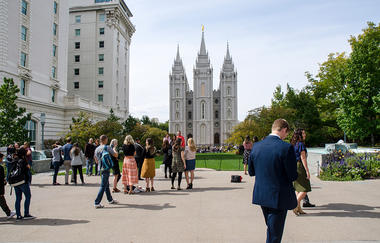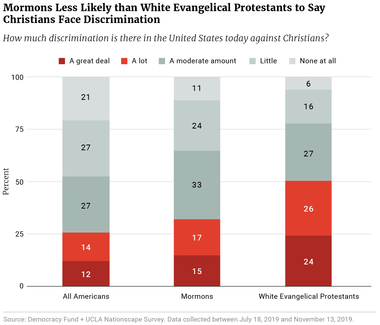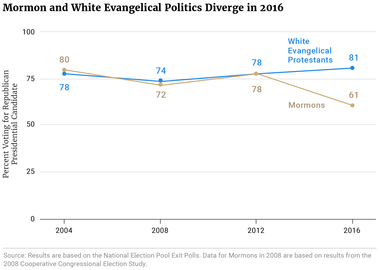Elections, Political Parties, Religion

For much of Donald Trump’s presidency, scholars and journalists have invested considerable time trying to understand white evangelical Protestants’ unwavering support for the president. However, there is another highly religious, Republican-leaning group that Trump has struggled to win over: Americans who belong to the Church of Jesus Christ of Latter-day Saints (LDS), a group more generally referred to as Mormons.(1) In the Trump era, while white evangelical Protestants continue to back the president, Mormons are forging a more independent political path.
Using data from Democracy Fund + UCLA Nationscape™ — a survey interviewing more than 6,000 Americans each week — I examine the views Mormons have toward American political parties, their feelings about the place of Christianity in society, and how they plan to vote in 2020. Though Mormons are typically too small of a group to analyze using traditional national surveys, the size of the Nationscape survey allows us to analyze small but vital subgroups in the American electorate. Combining data collected between July 18, 2019 and November 13, 2019, this analysis is based on more than 1,300 interviews of Mormon Americans.
Several findings stand out. First, despite their similar levels of identification with the Republican Party, Mormons are less likely than white evangelical Protestants to have a positive opinion of Republicans and a negative view of Democrats. Second, Mormons are less likely to hold views that have been a key part of Trump’s appeal to conservative Christians — namely, narratives that highlight the dual threats of religious decline and immigration-fueled demographic changes. Finally, while white evangelical Protestants and Mormons have had nearly identical presidential voting patterns since 2004, their voting patterns diverged sharply in 2016. Heading into 2020, Mormons are not the stalwart Republican supporters they have been in previous election cycles.
(1) Because this blog post includes a large number of references to members of the Church of Jesus Christ Latter-day Saints but also compares them to different religious groups, I use “Mormons” as shorthand for the sake of clarity and consistency. According to the Associated Press (AP) Stylebook, the term “Mormon is based on the church’s sacred Book of Mormon and remains in common use by members of the faith.”
Americans who belong to the Church of Jesus Christ of Latter-day Saints are part of one of the most Republican-leaning denominations in the United States. According to Nationscape data, about two-thirds (65 percent) of Mormons identify as Republican or lean toward the Republican Party. This is similar to the Republican partisan identification of white evangelical Protestants (71 percent).
Despite the comparable levels of Republican affiliation overall, Mormons are less likely to report a favorable view of the GOP than are white evangelical Protestants. Only about half (54 percent) of Mormons say they have a somewhat or very favorable impression of Republicans. By contrast, more than two-thirds (67 percent) of white evangelical Protestants say they have a favorable opinion of Republicans.
Mormons also express less disaffection toward Democrats than white evangelical Protestants do. About half (53 percent) of Mormons report having an unfavorable view of “Democrats,” while nearly two-thirds (64 percent) of white evangelical Protestants say the same. There is also a sizable intensity gap; Mormons are less likely to say they have a very unfavorable view of Democrats than white evangelical Protestants (28 percent vs. 40 percent).
Trump’s appeals to conservative Christian voters consistently rely on invoking religious decline. At the 2019 Values Voter Summit, an annual political conference of conservative Christian activists hosted by the Family Research Council, Trump argued that liberals were “waging war” on Christians and “trying to hound you from the workplace, expel you from the public square and weaken the American family and indoctrinate our children.”
However, the perception that Christians are losing cultural and political influence is less widely accepted among Mormons than it is among white evangelical Protestants. Fewer Mormons than white evangelical Protestants believe there is a great deal or a lot of discrimination against Christians (32 percent vs. 50 percent). While 35 percent of Mormons say there is little discrimination or none at all, just 23 percent of white evangelical Protestants share that sentiment.

Mormons are also less likely than white evangelical Protestants to support displays of religious expression being allowed on public property, such as in public schools and courthouses. While the overwhelming majority (85 percent) of white evangelical Protestants support displaying the Ten Commandments in public schools and courthouses, just about six in 10 (61 percent) Mormons share that view.
Trump’s appeals to fears about cultural change and immigration have been another perennial feature of his presidency. However, Mormons are also more accepting of immigrants and less concerned about cultural or demographic changes brought about by immigration than are other religious conservatives. About seven in 10 (69 percent) white evangelical Protestants compared to 58 percent of Mormons have an unfavorable view of “undocumented immigrants.” Similarly, Mormons are less likely than white evangelical Protestants to support a policy that would deport all undocumented immigrants (37 percent vs. 55 percent).
Since 2004, Mormons and white evangelical Protestants have had remarkably similar voting patterns in presidential elections. Similar numbers of Mormons and white evangelical Protestants voted for George W. Bush (80 percent vs. 78 percent), John McCain (72 percent vs. 74 percent), and Mitt Romney (78 percent vs. 78 percent).(2) This is exactly what you might expect from two similarly Republican-leaning groups.
However, Donald Trump has never been the most popular Republican among members of the LDS community and struggled to attract Mormon voters in the 2016 general election. While about eight in 10 (81 percent) white evangelical Protestants voted for Trump, just 61 percent of Mormons did the same.
(2) Analysis based on the National Exit Polls for 2004, 2012, and 2016. Data from the 2008 election comes from the Cooperative Congressional Election Study.

Almost three years into Trump’s first term, Mormons generally approve of the job he is doing as president, but a substantial number offer more critical assessments of his performance. A majority (55 percent) of Mormons say they approve of the job Trump is doing as president, but four in 10 (40 percent) disapprove. Notably, relatively few Mormons strongly support the president. Roughly as many Mormons report that they strongly approve of Trump’s performance as say they strongly disapprove (25 percent vs. 23 percent).
The story among white evangelical Protestants is quite different. According to Nationscape data, 71 percent of white evangelical Protestants approve of Trump’s job performance as president, including 42 percent who strongly approve. Only 26 percent say they disapprove.
Looking forward to the 2020 presidential race, there is more evidence of the political divide between these two groups. In head-to-head matchups, Mormons are less likely than white evangelical Protestants to say they would support Trump regardless of whether he were facing off against Joe Biden (58 percent vs. 72 percent), Bernie Sanders (63 percent vs. 75 percent), or Elizabeth Warren (60 percent vs. 74 percent).(3)
At just 2 percent of the adult population, Mormons are not the most critical electoral voting bloc. Given their strong Republican leanings, it is also unlikely that we will see a mass Democratic defection of Mormon voters in 2020. Yet these results might be a warning flag for the Trump campaign. They suggest that Trump will have a difficult time improving on his 2016 performance among Mormon voters. Additionally, if Mormon voters decide to support a third-party candidate or sit out the election entirely, it could make the difference in western states, such as Arizona and Nevada, where they make up a larger share of the voting population.
In the past, Republican presidential candidates have been able to rely on the vote, funding, and grassroots energy of this religious and socially conservative constituency. That Mormon support for Trump remains so tepid is remarkable given how polarized our politics has become. Over the next 12 months, it seems inevitable that we’ll continue to monitor Trump’s political fortunes among white evangelical Protestants, but if we want to more thoroughly assess his chances in 2020, we would do well to understand the political preferences and motivations of Mormons as well.
Daniel Cox is a political scientist and Research Fellow at the American Enterprise Institute. Views expressed here are his own and do not necessarily reflect those of the collective Voter Study Group.
(3) Matchup numbers are based on respondents who said that they were registered to vote and that they intended to vote in 2020.
Subscribe to our mailing list for updates on new reports, survey data releases, and other upcoming events.